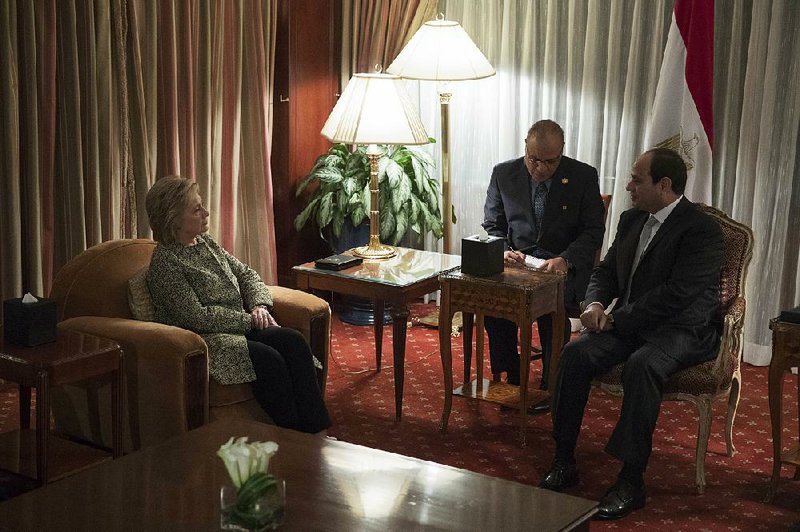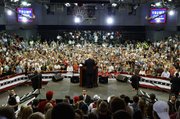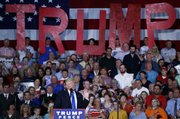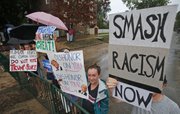KENANSVILLE, N.C. -- Donald Trump is spending a lot of time in North Carolina but campaigned Tuesday evening far from cities like Charlotte and Raleigh, where many candidates have courted moderate voters in recent years.
RELATED ARTICLE
http://www.arkansas…">Trump tapped charity to settle suits, files show
FULL ELECTION COVERAGE
Instead, he zeroed in on Kenansville, a tiny, rural town of about 850 people, to make his pitch to the disaffected, working-class white voters who have propelled his campaign. The strategy appears to be less about swaying undecideds and more about making sure supporters don't stay home on Election Day.
Registered Democrats outnumber registered Republicans 2-1 in Duplin County, but voters there have chosen the GOP presidential candidate in the past two elections by a wide margin. Among those lifelong Democrats is James Teachey, a 78-year-old retired farmer who said this year was the first time he donated to a presidential campaign: $40 to Trump.
"People are sick and tired of the way things are going in Washington and the way people are running it," he said. "I was born coming out of the Depression. We know what a dollar means, what leaving your door unlocked means. And all those things are gone."
Trump's business background is a big draw for his supporters in Kenansville. Pork and poultry growers and processing plants employ thousands in Duplin County and have drawn Hispanic residents who now account for more than 20 percent of its population of 60,000.
Still, Trump drew cheers with vows to get tough on immigration during his speech at the Duplin County Events Center on the outskirts of Kenansville. He also garnered applause by promising to draw manufacturing jobs back to the state.
"They're making a fortune in Washington pushing trade deals that take jobs away from North Carolina and all these states. Those days are over. The jobs are coming back," he said.
Earlier in the day, he addressed a crowd in High Point, a hub of the declining furniture industry that was hit hard by the loss of manufacturing jobs but still hosts a world-renowned furniture trade show.
Not many high-profile candidates have gone through Duplin County over the years. Asked if he could remember any other presidential campaign visits, Teachey laughed and said he thought Eleanor Roosevelt was there decades ago.
While North Carolina is dotted with left-leaning urban areas such as Raleigh and Charlotte, it also has one of the country's largest rural populations. A 2012 analysis by the Census found North Carolina ranked second only to Texas with 3.2 million rural residents.
State figures show Duplin County has about 18,000 registered voters who are white, while 9,000 are black and 1,200 are Hispanic.
For voters like Bill Link, a retired U.S. Marine officer from nearby Beulaville, Trump's promises to improve the economy are what really matter.
"The majority of people right now are leaning for Trump," said Link, who drives trucks and owns a carnival equipment rental business. "Because we're all working people. We all work for a living. We're blue-collar, and we believe that the country has gone the wrong way."
Fight against terror
Democratic presidential nominee Hillary Clinton, meanwhile, sought Tuesday to present herself as a model of "steady leadership" in the face of terrorist attacks and took a shot at Trump's temperament and preparation for handling such moments.
"We know what it takes," Clinton said at the outset of a call with a team of national security and counterterrorism advisers. "We can't lose our cool and start ranting and waving our arms. We shouldn't toss around extreme proposals that won't be effective and lose sight of who we are. That's what the terrorists are aiming for."
Clinton and Trump have jockeyed to appear the best positioned to handle and head off such moments during their potential presidencies.
Trump has blamed President Barack Obama and Clinton, who served as Obama's first secretary of state, for insufficient efforts and suggested that profiling is necessary to counter the threat.
"Her attacks on me are all meant to deflect from her record of unleashing this monstrous evil," Trump said of Clinton during his campaign event in High Point. "She will say anything to distract from that record."
He also reiterated his belief that immigration should be restricted from "dangerous regions" in order to combat "radical Islamic terrorism."
Clinton has sought to emphasize her experience as secretary of state and as a senator from New York, telling reporters Monday that she is "the only candidate in this race who has been part of the hard decisions to take terrorists off the battlefield."
She pressed that argument during Tuesday's call with advisers, according to a transcript provided by the campaign.
"Events of the past few days have underscored that to defeat the terrorists we need experienced, steady leadership," she said. "Calm, not panic. Resolve, not fear. I've been with many of you in the Situation Room advising on operations to prevent terrorist attacks and bring terrorists to justice."
Information for this article was contributed by Jonathan Drew of The Associated Press and by John Wagner and Jose A. DelReal of The Washington Post.
A Section on 09/21/2016



